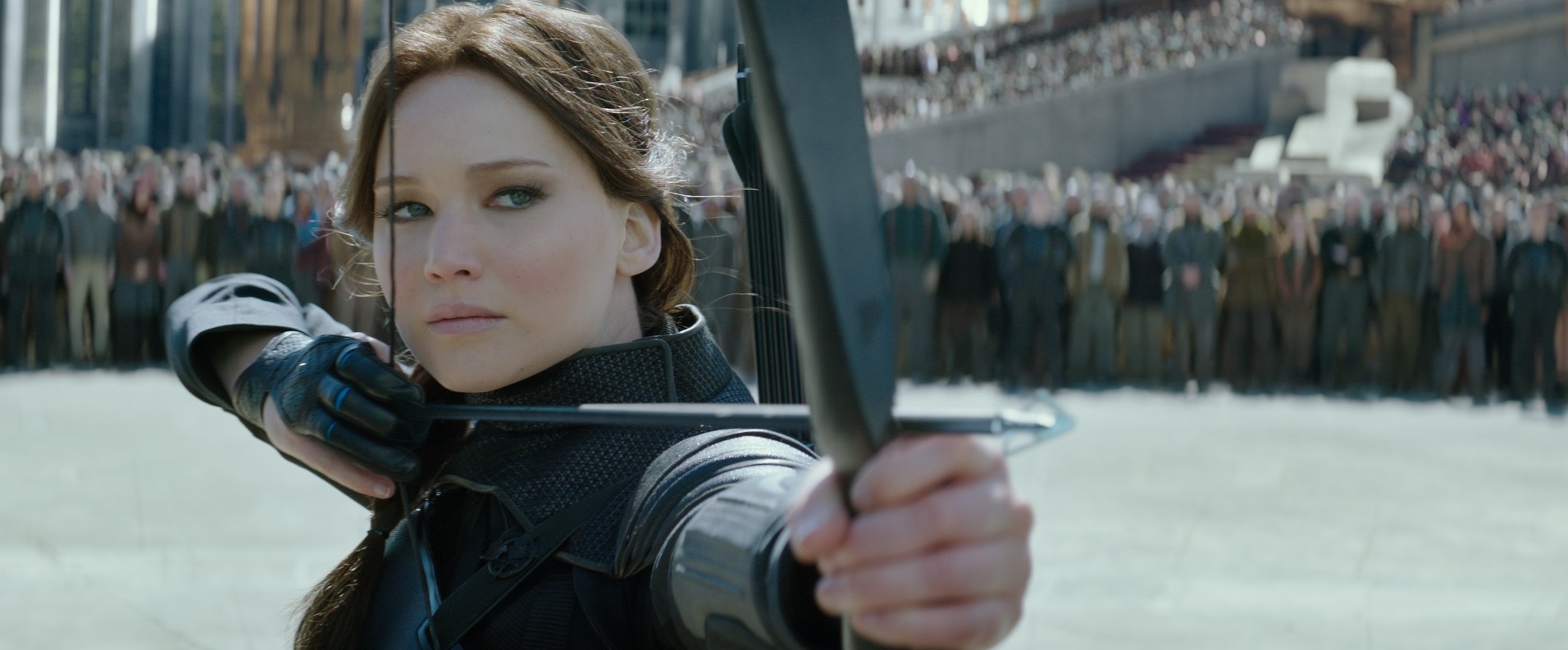
MPAA Rating: PG-13 | Rating: ★★★
Release year: 2015
Genre: Adventure, Coming-of-Age, Sci-Fi Director: Lawrence
Real or not real?
This is the question a brainwashed Peeta keeps asking Katniss in the final chapter of this dystopian series, which feels less like a dystopia and more like a dark allegory of our world’s present state:
Children are killed by wanton violence because of adults’ political values and “ends justify the means” ethics.
Refugees seeking shelter find themselves stopped at the gates of the wealthy and caught up in the crossfire of civil war violence.
A ubiquitous mass media constantly interrupting our lives, being used to manipulate the truth and turning the entire world into a reality TV series.
Mockingjay – Part Two picks up right where Part One left off, with Katniss learning to find her voice both literally and figuratively as she recovers from a violent attack by the brainwashed Peeta. The film quickly moves into action mode, with Katniss at the front lines of the “liberation” of District 2 as the rebels bury the loyalists in a mountain. As the rebels reach the Capital’s borders, the devilish President Snow unleashes pods throughout the city, turning the urban landscape into the latest version of the Hunger Games.
You’ll have to suspend your disbelief and logic as Katniss and her team of soldiers enter the city on a mission to find and kill Snow. Decisions are made that make little sense, and Snow’s entire plot feels far-fetched–abandon and destroy your own city, but to what end? And how can the Capital’s forces somehow avoid the same traps? The action sequences are well-paced and very intense, especially a scene where the team navigates a maze of subterranean tunnels while being hunted by the zombie-like “mutts,” whose design is a direct copy of the monsters from The Descent. The scene of soldiers slowly moving through dark tunnels harkens back to Aliens, quietly tense and unnerving until the explosive action begins.
I’ve found that the final book in The Hunger Games series is the most divisive. People seem to either love it or hate it, with few feeling indifferent. In terms of the films, Part One of Mockingjay might be the most intriguing and full of ideas due to its lack of the actual hunger games, and the questions about media, manipulation, propaganda, and the ethics of violence (though my personal favorite in the film series is Catching Fire). Part Two is the weakest of the films, but that doesn’t mean it’s poorly done or inept. The directing is functional, follows its source material fairly well, has some memorable moments of action and tension, and wraps up the arc of Katniss in a way that likely will satisfy some and infuriate others. Hence the divisiveness–you’ll probably either love or hate the ending of this film, and I think it all depends on your interpretation and your appreciation of the series up until this point. Without going in spoilers, I found the film’s ending to be anachronistic and illusory, both in form and content. It doesn’t quite feel real, which is perhaps the whole point. Real or not real?
Where the book actually angered me both in its plot elements–a number of key, likable characters are killed off–I found myself strangely unmoved by the same moments in the film. Perhaps Part Two relies too heavily on the character development and relationships built in Part One, and any sense of distance between those films lessens the emotional impact. In any case, I found the film’s attempts at pathos and poignancy to fall flat, despite the grief-worthy events unfolding on screen. In a film where young people and children are killed for sport or strategy, the tragedy never fully hits home. And it should–the death of children should cause an immense emotional reaction.
The power of The Hunger Games series lies in being immediately accessible and chock full of interesting, prophetic ideas. Where other Y.A. dystopian tales may succumb solely to romance or coming-of-age tropes–Hunger Games has both of these too–this series is genuinely entertaining, has some great performances (especially from Jennifer Lawrence), and asks tough questions about our own culture’s tendencies towards violence, consumerism, and turning a blind eye to the future of our young. Real or not real? While The Hunger Games invites us to face our own reality, I’m still unsure if this final installment has the staying power to prompt our repentance. We need more than politics, propaganda, and prophetic outrage–we need salvation from our own brokenness.
IMDB Listing: http://www.imdb.com/title/tt1951266/